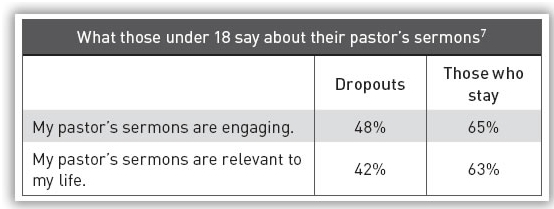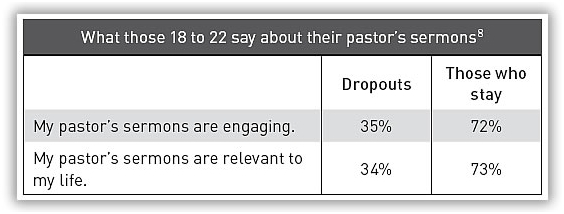Preaching to the Younger Generation
Sam Rainer
Dan Garland over at LifeWay recently compiled some material in an article on the importance of preaching. You can read the full article here. He included an excerpt from my book, Essential Church, which I’ve posted below.
Is preaching still important? Yes! Even in today’s hyper-techno-driven conversational-wiki-culture, preaching is of the utmost importance. Of the several church-related or pastor-related issues noted by dropouts, preaching came up several times as a critical issue in retaining college students and young adults.
While most think that students are turning off the sermon, tuning into something different, and dropping out of the church, nothing is further from the truth. Students in the church, both high school and college, view the pastor’s sermon with a level of importance. They have their eyes on him and what he is saying to them (or not saying to them, for that matter).
It shouldn’t surprise you that biblical truth must be conveyed to all age groups, especially through to sermon. But shockingly, students desire for the pastor to preach to them! The problem is not a willingness on their part to listen. Rather, the problem is the fact that the pastor is not engaging them where they are. The charts below reveal how two separate age groups view the importance of their pastor’s sermons.
Not only are the pastor’s sermons critical to the assimilation of those under 18 (above), they gain a level of importance with those between the ages of 18 and 22 (below). In other words, the older teens become, the more important it is for the pastor to relate to them through the weekly sermons.
As seen in these two charts, the spread between dropouts and those who stay increases with the age of the student. This spread is driven by how well the pastor’s sermons relate and engage each of these specific age groups.
Particularly with those over 18, how well a pastor engages and relates to this age group correlates directly with how long they will stay in the church. Don’t make the mistake of thinking that these teens will “grow into” the message you preach. Our research proves the opposite – the older the teen, the more critical it is to reach them at their stage in life. Rather than creating sermons for the 45 and above crowd, gear sermons or segments of sermons specifically for the teens in your church. The pastor’s sermon still remains one of the lynchpins in keeping students in the church. As a result, the buck still stops in the pulpit with this generation.









Fascinating research. I have read Essential Church, and I think it is one of the best books on the church in several years. Thanks for your good work.
Sam, Essential Church is on my Amazon Wishlist– I hope to get to it later this fall.
Meanwhile, can you help me with this: what were offered as the definitions of the terms/phrases “engaging” and “relevant to my life”?
Engaging seems pretty straightforward; but “relevant to my life” can have a hoard of meanings, some of which may or may not be the biblical mandate of preaching. I’m curious how your study accommodated this spectrum.
Thanks.
Ed – thanks in advance for purchasing the book. As for the definitions, the survey did not include specifics – we just asked the question. But the same group that wanted a “relevant” and “engaging” sermon also wanted biblical depth. We make the conclusion in the book that depth and cultural relevance are not mutually exclusive with the younger generation.
Great– that’s exactly what I wanted to know.
(Count on a Rainer to get the data parsed well…)
Sam,
Just started following your blog. I appreciate this post. And I am presently reading Essential Church. It’s good stuff. I’ve spent too much of the ministry focused on the wrong age groups (older). I’m presently an XP, but am leading a young adult class. I’m finding the book helpful in understanding and entering the culture of college and youth students.
Sam, just to give a rough estimate, of all the young people I know that have changed churches, about 80% changed due to the preaching. Young people want a sermon they can relate to. They want it understandable and usable. They want it relevant!
My sample is small and localized, but that is the reality on the ground where I am.
Good stuff Sam! Hope all is well down in FL.
Thanks for the input Jimmy.
Ross – things are great. We baptized dozens at the beach yesterday. And we’re looking to start a Saturday service!
The challenge can be, like in any other examination of demographic segments, ways of effectively reaching the 18-25 population can be less than ideal for 35-45 range. With multiple universities nearby, I have found that when I’ve delivered a sermon series that dives deep into Scripture with a respectful consideration for history, culture, translation of content to the present day it can create a positive “buzz” of intrigue and respect from the 18-25 crowd. The same messages can seem a little “heavy” to segments outside that unique target.
The study is right on, though – getting collegiate or young professionals has a lot to do with earning merit of relevance, validity, and (in their own words) “intellectual respectability” from the pulpit.